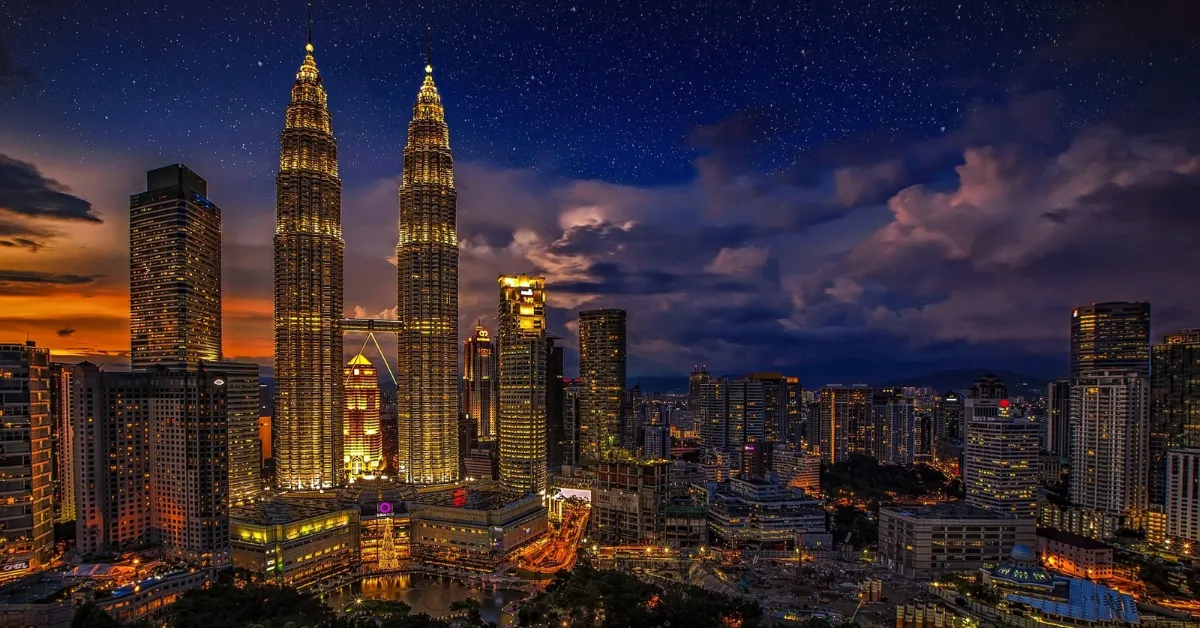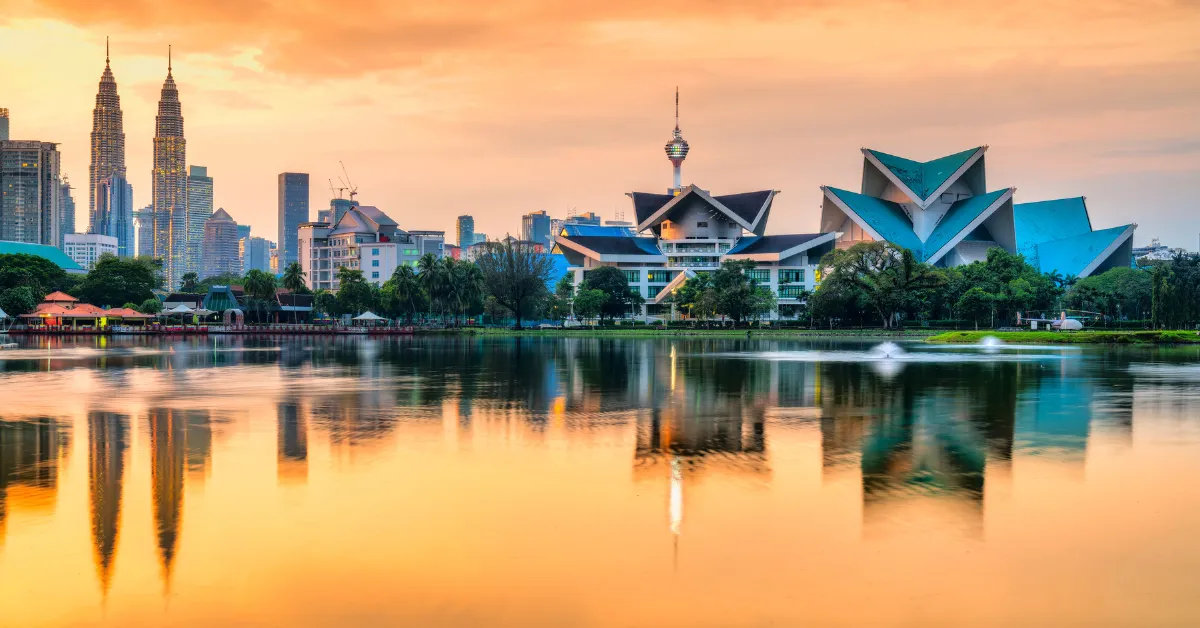Looking to move to Asia, but not sure where to rest your head for a while?
If you’ve been thinking of moving to Malaysia, check out the following pros and cons of living in Malaysia.
Malaysia is a country with lots to offer ex-pats. From its bustling cities to its pristine beaches and idyllic islands, there is a mix of destinations to choose from for anyone considering moving to the country.
With some of the best bang for your buck anywhere in the world, a diverse community, and exquisite national dishes, it’s no wonder so many digital nomads and ex-pats are drawn to the Asian nation, but is it all it appears?
In these pros and cons of living in Malaysia, we’ll be diving into the biggest advantages AND the drawbacks you might not have considered of living in the country before you take the leap.
Pros Of Living In Malaysia
There are many pros of living in Malaysia as an expatriate. Whether you’re looking to move to the country for a season or forever, here are the top reasons that will make you book a flight ASAP.
Low Cost Of Living
One of the biggest advantages of living in Malaysia is its affordability. Even in the capital city of Kuala Lumpur, you can live well on $1,000 per month. To put it into context, rent on average costs over 70% less than in the United States.
While you could pay up to $750 for an apartment in an expensive neighborhood in the city, you can pay as little as $450 for an apartment of the same size in a less wealthy neighborhood.
If you step away from the main cities altogether, you’ll find the costs of housing are even cheaper.
Utilities are also affordable and will set you back roughly $50 per month. This includes electricity, WiFi, and gas.
The cost of healthcare is a major benefit of living in Malaysia. There is a public healthcare system in place. However, healthcare is so affordable that many ex-pats choose to go private when faced with a medical issue, which costs around $15.
The cost of buying a car is extortionate, but public transportation is cheap and reliable. It’s also very affordable to run a moped, which many foreigners choose to do instead. You can get a plate of traditional Malaysian food for under $2 if you choose to eat locally.
The cost of living in Malaysia does vary depending on where you live, for example, Penang is known to be a little cheaper than Kuala Lumpur. However, wherever you settle, you’ll find the prices to be significantly lower than in the western world.
Delicious Food
We’ve never met an Asian cuisine we didn’t like. However, Malaysian cuisine is ESPECIALLY phenomenal and we’ll tell you why. The Malaysian population is made up of three main cultures — Malay, Indian, and Chinese.
Residents of China originally fled to Malaysia in droves after the Opium Wars in the 19th century. The Malaysian government desired Indians to cross the border for cheap labor to establish plantations in the 19th and 20th centuries.
This means that today, Malaysia is a mixing pot of cuisines. Wherever you are in the country, you’ll find Indian restaurants serving hot chapatis straight out of a clay oven and Chinese joints with mouthwatering buffets.
The most traditional Malaysian dish is Nasi Lemak, which is rice that has been steamed with coconut milk and pandan leaves, served with a hot and kicking sambal, half of a boiled egg, cucumber, fried peanuts, and anchovies. Once the basis is formed, you can add other elements to your Nasi Lemak, such as fried chicken.
If you’re vegetarian or vegan, you’ll get by just fine in Malaysia. There is an assortment of restaurants that cater to Tao Buddhists, who typically consume a vegan diet without onions or garlic. Indian cuisine is also very veg-heavy, and Malaysian dishes can be easily tweaked to avoid meat products.
English Is Widely Spoken
If you’re looking for a country that doesn’t take much acclimatization, you should consider Malaysia. From healthcare professionals to public transportation officials, most of the population can speak at least passable, and often excellent English.
Even the road signs are usually printed in English, as well as Malay, which makes adjusting to life in Asia super easy.
As you travel further out of the main cities, you’ll hear English a lot less, and it’s not as common to be able to converse with a local in your mother tongue. However, if you don’t know any Malay, you’ll still be able to get by in rural towns across the country.
On the other hand, if you stick to the cities, you’ll find communication is easy, and you might find you don’t need to learn a single word (although we advise you do!)
Simple Living
Malaysians know how to live an easy and relaxed existence. While western countries are hung up on living the rat race, on a constant hamster wheel chasing success, Malaysians are content on slowing down and enjoying the simple joys of life.
You’ll experience less pressure of modern-day life in Malaysia and you’ll be able to feel your cogs unwind as you adjust to letting go of the constant need for productivity.
The outdoor lifestyle and fantastic weather both help when it comes to creating a lifestyle that prioritizes happiness. You’ll find yourself enjoying the little things, such as a beautiful sunset or a hike through a tea plantation, a lot more once you allow yourself to be in the moment.
Multi-Cultural Society
As we mentioned before, Malaysians are a diverse bunch. Over 20% of the population is of Chinese origin, and over 6% is originally from India. On top of the three main cultures — Malaysian, Chinese, and Indian — Malaysia also attracts many other nationalities, such as Singaporean and Persian.
Because of this wide array of cultures, Malaysia is steeped in rich traditions. You can find Muslim temples, Buddhist places of worship, and Christian churches all within spitting distance of each other. You can see a plethora of customs on display, which include the traditional Malaysian Joget dance.
From street art to food to religious customs, you’ll find that Malaysia is a diverse country though and through.
Cons Of Living In Malaysia
There are more benefits than disadvantages of living in Malaysia. However, you should consider these points so that you’re not shocked or disappointed on arrival.
Air Pollution
Like many destinations in Asia, Malaysia struggles with air pollution. This is more apparent in large cities, such as Kuala Lumpur and Penang, where you’ll find yourself in a thick layer of smog.
While it may seem like no big deal, the poor air quality can have a detrimental effect on your overall health, which is why it’s one of the biggest drawbacks of living in Malaysia, and definitely a point to consider before moving there.
Air pollution in Malaysia is caused by a variety of factors, including emissions from cars and scooters, as well as industrial manufacturing.
If you arrive in the country between the months of July and October, you may find the air quality to be particularly poor due to annual forest fires and biomass burning.
Malaysia is supposedly working on improving its air quality after the World Health Organization (WHO) updated its guidelines for ambient air quality in 2021. However, there is still a long way to go before the country is on par with others.
If you wish to avoid this issue, head to destinations outside of major cities, such as Langkawi Island. If you love the city lifestyle, consider laying roots in the city of Malacca, which has an air quality rating of “moderate” with an air quality index that is 10 points higher than Kuala Lumpur.
Mass Infrastructure
Spare corner? Stick a building on it. In fact, if you left your suitcase alone long enough, it would probably get built upon. Mass infrastructure is an issue in Malaysia, particularly in major cities. However, this con of living in Malaysia is a double-edged sword.
On the one hand, too much construction can cause issues for locals and ex-pats alike. However, the quality of Malaysia’s infrastructure is excellent, making living in the country easy.
Overall, there must be a happy medium, which is hard to balance. In large cities, you’ll find there are mass irresponsible construction projects.
However, in towns and villages across the nation, you may find the infrastructure to be severely lacking, with poor public transport connections and slow internet.
Corrupt Government
While the state of the government won’t bother you as much as an ex-pat as it would a Malaysian national, you’ll be affected by laws as long as you choose to live in the country.
In 2020, the former Malaysian prime minister was convicted of seven counts of abuse of power, as well as money laundering and criminal breach of trust.
We’d like to say that’s where the corruption ended, but it’s just not true. The majority of Malaysians — over 70% — are aware of the corruption that occurs at a governmental level, and are doing their best to overturn these shady practices; however, it’s a slow process.
The issue is complex, with several layers, but the government itself is supposedly working at curbing corruption.
Final Thoughts On Living In Malaysia
Now you’ve heard the pros and cons of living in Malaysia, which side of the fence do you sit on?
Malaysia is one of the best countries in Asia for making your money stretch while maintaining a fantastic quality of living. If you love witnessing a throng of vibrant cultures, each with its own customs, foods, and religions, Malaysia is definitely for you.
Likewise, if you’re looking to slow down and enjoy the simpler things in life, you’ll love the relaxed pace of life in Malaysia.
However, if you’re looking for a destination that is completely unspoiled, with zero political issues, Malaysia may not be for you.
If that’s the case, check out these other destinations:
- Pros and cons of living in Turkey
- Pros and cons of living in France
- Pros and cons of living in Thailand
Do you have your travel insurance?
- ☑ SafetyWing offers affordable travel medical insurance. Prices start at $45.08 / 4 weeks.
- ☑ Created by nomads, for nomads.
- ☑ Covers quarantine and Covid-19.
- ☑ You can pay per month, and stop at anytime.



